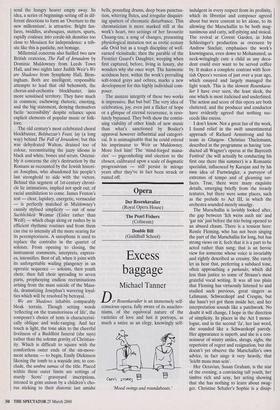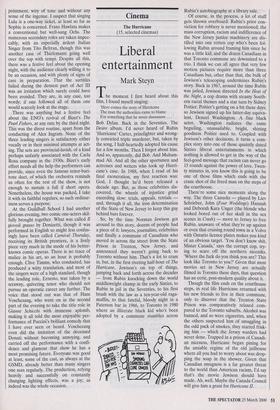Opera
Der Rosenkavalier (Royal Opera House) The Pearl Fishers (Coliseum) Double Bill (Guildhall School)
Excess baggage
Michael Tanner
Der Rosenkavalier is an immensely self- conscious opera, fully aware of its anachro- nisms, of the equivocal nature of the varieties of love and lust it portrays, as much a satire as an elegy, knowingly self- Mood swings and roundabouts.' indulgent in every respect from its prolixity, which its librettist and composer agreed about but were content to let alone, to its allowing the Marschallin to be both mag- nanimous and catty, self-pitying and stoical. The revival at Covent Garden, in John Schlesinger's production as overseen by Andrew Sinclair, emphasises the work's knowingness, even down to Mohammed, as neck-wringingly cute a child as any deca- dent could ever want to be served coffee by. It makes a complete contrast with Scot- tish Opera's version of just over a year ago, which essayed and largely managed the light touch. This is the slowest Rosenkava- lier I have ever seen, the least sleek, the one which is most italicised and underlined. The action and score of this opera are both cluttered, and the producer and conductor have evidently agreed that nothing suc- ceeds like excess.
I don't know. Not a great fan of the work, I found relief in the swift unsentimental approach of Richard Armstrong and his team in Glasgow. Christian Thielemann, described in the programme as having 'con- ducted all Wagner's operas at the Bayreuth Festival' (he will actually be conducting his first one there this summer) is a Romantic specialist, influenced by Karajan and by his bwn idea of Furtwangler, a purveyor of extremes of tempo and of gleaming sur- faces. True, there were many exquisite details, emerging briefly from the treacly textures, but there were some places, such as the prelude to Act III, in which the orchestra sounded merely smudgy.
The Marschallin is lavishly looked after, the gap between 'Ich weiss auch nix' and 'gar nix' just before the trio being opened to an absurd chasm. There is a tension here: Renee Fleming, who has not been singing the part of the Marschallin for long, but has strong views on it, feels that it is a part to be acted rather than sung; that is an heroic view for someone whose voice is invariably and rightly described as creamy. She rarely let us hear that, preferring a subdued tone, often approaching a parlando, which did less than justice to some of Strauss's most grateful vocal writing. It was all too plain that Fleming has virtuously listened to and studied such previous, great singers as Lehmann, Schwarzkopf and Crespin, but she hasn't yet got them inside her, and her interpretation sounds like a patchwork. No doubt it will change, I hope in the direction of simplicity. In places in the Act I mono- logue, and in the second `Ja', her last word, she sounded like a Schwarzkopf parody. Her appearance is superb, and she is a con- noisseur of wintry smiles, shrugs, sighs, the repertoire of regret and resignation, but she doesn't yet observe the Marschallin's own advice, in fact sings it very heavily, that leicht muss man sein'.
Her Octavian, Susan Graham, is the star of the evening, a convincing tall youth, her timbre rich and sexy, her acting showing that she has nothing to learn about swag- ger. Christine Schafer's Sophie is a disap- pointment, wiry of tone and without any sense of the ingenue. I suspect that singing Lulu is a one-way ticket, at least so far as Sophie is concerned. Franz Hawlata makes a conventional but well-sung Ochs. The numerous secondary roles are taken impec- cably, with an especially ardent Italian Singes from Tito Beltran, though this was another case of Thielemann going well over the top with tempi. Despite all this, there was a festive feel about the opening night, with the audience clearly willing it to be an occasion, and with plenty of signs of care in preparation. That the surtitles failed during the densest part of Act III was an irritation which surely could have been avoided. They are, in any case, too wordy; if one followed all of them one would scarcely look at the stage.
There was anything but a festive feel about the ENO's revival of Bizet's The Pearl Fishers, at any rate by the third night. This was the direst routine, apart from the conducting of Alex Ingram. None of the three leading singers is satisfactory either vocally or in their minimal attempts at act- ing. The sets are provincial-lavish, of a kind perhaps unfairly associated with the Carla Rosa company in the 1930s. Bizet's early effort needs all the help the performers can provide, since even the famous tenor-bari- tone duet, of which the orchestra reminds us often for the rest of the show, is not enough to sustain a full if short opera. Nonetheless, the house was packed, I take it with its faithful regulars, so such ordinar- iness serves a purpose.
At the Guildhall School I had another glorious evening, two comic one-acters skil- fully brought together. What was called Ii giovedi grasso by Donizetti, though it was performed in English so might less confus- ingly have been called Carnival Thursday, receiving its British premiere, is a lively piece very much in the mode of his better- known comic operas. There is no trace of malice in his art, so an hour is probably enough. Clive Timms, who conducted, has produced a witty translation, and most of the singers were of a high standard, though the leading role, Ernesto, was taken by a scrawny, quivering tenor who should not pursue an operatic career any further. The voice that stood out was that of Hans Voschezang, who went on in the second part of the evening to take the title role in Gianni Schicchi with immense aplomb, making it all told the most enjoyable per- formance of Puccini's brilliant comedy that I have ever seen or heard. Voschezang even did the imitation of the deceased Donati without becoming annoying, and carried off the performance with a confi- dence and glamour that show he has a most promising future. Everyone was good at least, some of the cast, as always at the GSMD, already better than many singers one sees regularly. The production, relying heavily and successfully on constantly changing lighting effects, was a joy; as indeed was the whole occasion.



































































 Previous page
Previous page